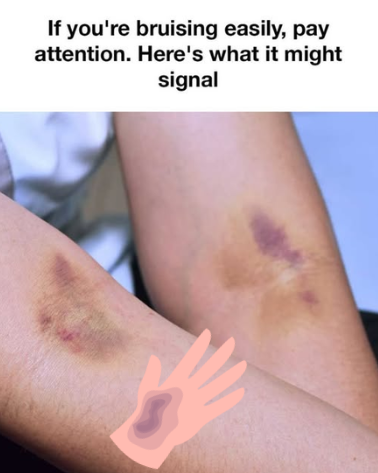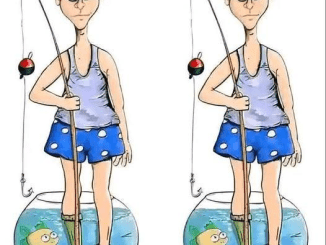
Bruises are something we’ve all dealt with—maybe from bumping into the edge of a table or taking a tumble during exercise. Usually, they’re harmless and fade away on their own. But when bruises start showing up too often, too big, or without any clear reason, it might be your body trying to get your attention. Easy bruising isn’t just a cosmetic issue; it can be a signal of deeper health concerns. Let’s break down what’s normal, what’s not, and what you should know before brushing off those mysterious marks.
Understanding Bruising: What’s Normal and What’s Not
Bruising, also known as contusions, happens when tiny blood vessels under the skin break and leak blood into surrounding tissues. At first, bruises may look red, then shift to shades of purple, blue, green, and yellow as they heal over two to three weeks.
For most people, an occasional bruise is nothing to worry about. However, if you notice frequent bruises, larger patches, or ones that appear without obvious cause, that’s when it’s worth paying closer attention.
Common Everyday Causes of Bruising
Not all bruises point to something serious. Some of the most common and benign causes include:
- Minor bumps or injuries you may not even notice.
- Fragile blood vessels, which can run in families.
- Fair or thin skin, where bruises simply look more dramatic.
- Lifestyle factors like smoking or drinking alcohol, which weaken vessel walls.
Still, even simple causes can become problematic if bruising happens regularly.
Vitamin Deficiencies That Play a Role
Your diet can directly impact how easily you bruise. Two key vitamins often linked to this issue are:
- Vitamin C: Essential for collagen production. Without enough, blood vessel walls weaken and break more easily.
- Vitamin K: Critical for proper clotting. A deficiency makes it harder for your body to stop bleeding under the skin.
Adding more citrus fruits, leafy greens, and colorful vegetables to your meals can help shore up your nutrient intake and strengthen blood vessels.
How Aging Affects Bruising
Aging skin tells its own story. As we grow older, our skin gets thinner and loses some of its protective fat layer, leaving blood vessels more vulnerable to impact. Collagen production also slows down, making vessels weaker and bruises more common.
That’s why older adults often find that even light bumps can leave behind large, noticeable marks that take longer to fade.
Medications That May Increase Bruising
Your medicine cabinet could be a hidden culprit. Certain medications make bruising more likely, including:
- Blood thinners like aspirin or warfarin.
- Corticosteroids, which thin the skin over time.
- NSAIDs such as ibuprofen, which affect clotting.
If you started bruising more after beginning a new prescription, it’s worth a conversation with your doctor.
Video : The Deeper Causes of BRUISING (Non-Injury Type)
When Bruising Signals a Bigger Problem
While most bruises are harmless, some are red flags for more serious issues. Seek medical attention if you notice:
- Large, painful bruises that appear without any injury.
- Frequent nosebleeds or bleeding gums.
- Blood in your urine or stools.
- Extreme fatigue or unexplained weight loss.
These could point to underlying conditions like blood disorders, liver disease, or even cancers such as leukemia. Early testing and diagnosis are key to catching problems before they worsen.
Home and Viral Hacks for Reducing Bruises
The internet is full of bruise hacks, but a few tried-and-true remedies stand out:
- Ice packs: Apply right after injury to constrict vessels and reduce bleeding under the skin.
- Arnica gel: A popular natural option believed to reduce inflammation.
- Warm compresses: After 48 hours, warmth helps increase blood flow and speed healing.
While not miracle cures, these simple remedies can help bruises fade faster and reduce soreness.
Strengthening Blood Vessels Through Diet
Food really is medicine. To build stronger vessels and minimize bruising, focus on:
- Vitamin C-rich foods like oranges, berries, and bell peppers.
- Vitamin K sources like kale, spinach, and broccoli.
- Bioflavonoids from onions, citrus, and dark berries to protect capillaries.
Pairing these nutrients with adequate hydration and balanced meals makes your body more resilient against bruising.
Blood Disorders and Easy Bruising
In rare cases, bruising can be a symptom of genetic or acquired blood conditions. Disorders like hemophilia and von Willebrand disease interfere with clotting proteins, while cancers like leukemia reduce platelet counts. These conditions require medical management and can’t be resolved with lifestyle changes alone.
Lifestyle Habits That Make a Difference
Everyday choices add up. Smoking damages blood vessels and slows healing, while heavy alcohol use strains the liver and reduces clotting factor production. On the flip side, regular exercise, staying hydrated, and maintaining a balanced diet can all lower your risk of chronic bruising.
When to Seek Professional Help
It’s always smart to listen to your body. If bruises appear more often, grow larger, or come with other concerning symptoms, don’t dismiss them. A doctor can run blood tests, check clotting function, and rule out more serious issues. The earlier you act, the better your chances of addressing any underlying problems.
Video : Why Do I Bruise Easily? (Common Sense Medicine)
Conclusion: Don’t Brush Off the Bruises
Bruising might seem like a small inconvenience, but it can be your body’s way of sending a warning. While many causes are harmless—like bumping into furniture or natural aging—others may signal vitamin deficiencies, medication effects, or hidden health problems. By paying attention, supporting your body with the right nutrients, and knowing when to see a doctor, you can protect both your skin and your long-term health.


